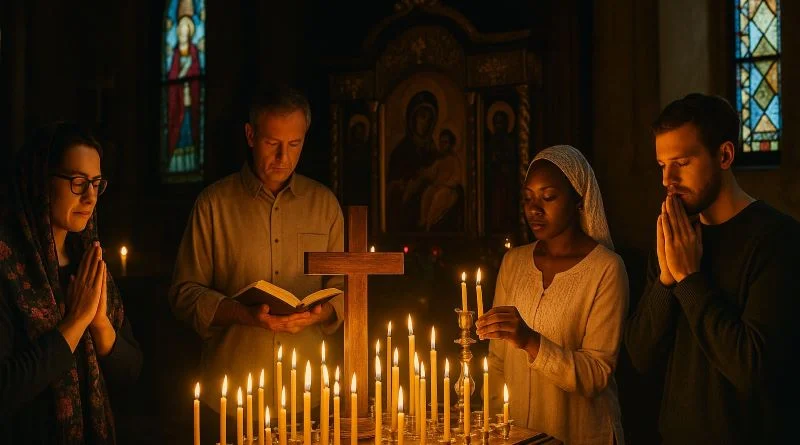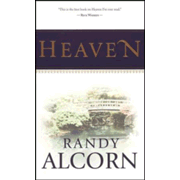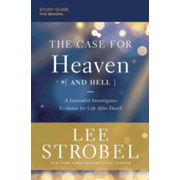
The Intersection of Faith and Mortality
Death is something we all face—whether it’s the loss of a loved one or contemplating our own mortality. As Christians, we often approach these moments with questions that run deep into our faith.
One of those questions is: Should Christians pray for the dead?
This isn’t just a theological debate—it’s deeply personal. Perhaps you’ve found yourself whispering a prayer for someone who’s passed away. Maybe you’ve wondered if those prayers matter or align with biblical truth.
In this article, we’ll explore what the Bible says about life after death, examine if there’s any biblical support for praying for the dead, and look at how different Christian traditions have approached this question over time.
Whether you’re navigating grief or seeking clarity, let’s look to Scripture for answers and hope.
The Biblical Perspective: Life After Death Explained

Key Biblical Verses Discussing Life After Death
The Bible gives us a clear view of what happens after death. It doesn’t leave us guessing.
“Just as people are destined to die once, and after that to face judgment…” – Hebrews 9:27 (NIV)
This verse reminds us that death is not the end but the doorway to judgment. It sets the stage for understanding why prayers for the dead are not emphasized in Scripture.
Another verse that provides hope for believers is:
“Jesus said to her, ‘I am the resurrection and the life. The one who believes in me will live, even though they die.’” – John 11:25
Jesus promises life after death to those who believe in Him. For believers, death is not defeat—it’s a transition to eternal life with God.
The First Resurrection: What It Means for Believers
Revelation 20:5-6 speaks of the “first resurrection,” which refers to the resurrection of believers who are in Christ.
“Blessed and holy are those who share in the first resurrection. The second death has no power over them…” – Revelation 20:6
This first resurrection is a hope we cling to. It affirms that our eternal destination is sealed by our relationship with Jesus—not by actions or prayers offered after we’ve passed away.
The Role of Judgment Day in Christian Theology
Judgment Day is another essential component of Christian belief about the afterlife. According to 2 Corinthians 5:10, we will each appear before the judgment seat of Christ.
“For we must all appear before the judgment seat of Christ, so that each of us may receive what is due…” – 2 Corinthians 5:10
There is no biblical indication that this judgment can be changed after death by the prayers of others. This raises an important theological question about the purpose and impact of praying for the dead.
What Does the Bible Say About Praying for the Dead?
Supporting Biblical References and Interpretations
When it comes to prayers for the dead, the Bible is mostly silent. In fact, most of the scriptural evidence points away from the practice.
One passage sometimes cited is 2 Maccabees 12:44-46, which mentions prayers for the dead.
However, this book is part of the Apocrypha and not included in the Protestant canon. For Catholics and Orthodox Christians, this passage is one reason for praying for the dead—but it’s important to note that this practice is not grounded in the accepted biblical canon of most denominations.
The New Testament never commands or models prayer for the deceased. In fact, Jesus, Paul, and the early Church consistently directed their prayers toward the living.
Historical Context: How Early Christians Perceived Prayers for the Dead
Early Christian writings from church fathers like Tertullian and Augustine suggest that some early believers did offer prayers for the departed, often as expressions of hope or remembrance rather than as a means to alter their eternal state.
However, these traditions developed after the time of the apostles and were influenced by evolving theological ideas, not direct biblical instruction.
Divergent Denominations: Views on Posthumous Prayers
Christian views vary:
- Catholic and Orthodox Christians often pray for souls in purgatory, believing that these prayers can help the dead on their journey toward heaven.
- Protestants, especially Evangelicals, typically reject this idea, citing Hebrews 9:27 and emphasizing that eternal destiny is decided at death.
“When a person dies, their eternal fate is sealed. There is no biblical support for changing that through prayer.” – a common view in Reformed theology
Exploring Ecclesiastical Traditions and Beliefs

Rituals and Practices: A Global Overview
Around the world, Christian communities have developed unique rituals tied to death and remembrance:
- Catholic Masses for the dead
- Eastern Orthodox memorial services (Parastas)
- Anglican All Souls’ Day observances
- Protestant “Celebration of Life” services
These practices reflect cultural and theological differences but are often rooted more in tradition than Scripture.
Factors Influencing Different Christian Denominational Views
Several factors shape how different Christians view praying for the dead:
- Theological doctrines (like purgatory vs. final judgment)
- Cultural customs (e.g., honoring ancestors)
- Biblical interpretation styles (literal vs. symbolic)
Ultimately, these differences highlight the importance of going back to the Bible as our foundation.
Cultural Influences and the Evolution of Beliefs Over Time
Over time, Christian beliefs have been shaped by various cultural influences. In some places, the desire to stay connected with loved ones has led to prayers, offerings, or even communication attempts with the dead.
However, the Bible warns against such practices:
“Let no one be found among you… who consults the dead.” – Deuteronomy 18:10-11
Our focus, as believers, is to trust God with our loved ones and live lives that reflect our hope in eternal life through Christ.
Conclusion: Reflecting on Faith, Hope, and the Afterlife
Implications of Prayers for the Dead on Personal Faith
While the desire to pray for the dead often comes from love and grief, the Bible encourages us to focus on praying for the living and sharing the gospel with those still able to respond.
Let your prayers be purposeful—lifting up those who are hurting, lost, or still seeking truth. There is power in praying for the living, not the dead.
Hope in the Afterlife: Overcoming Fear through Belief
If you’ve lost someone, be comforted that God is just and merciful. For those in Christ, death is not the end. It’s the beginning of eternity in His presence.
“To be absent from the body is to be present with the Lord.” – 2 Corinthians 5:8
As we grieve, we do so with hope—because we know death is defeated through Jesus.
Encouraging Personal Interpretation Through Scripture Study
I encourage you to seek God’s Word for yourself. Let Scripture shape your beliefs more than tradition or emotion. The Bible gives us all we need to understand life, death, and eternity.
Let’s hold fast to the truth that God is sovereign over life and death, and He is our eternal hope.
Key Takeaway
While some traditions include prayers for the dead, the Bible does not command or endorse this practice. Instead, Scripture emphasizes that each person’s eternal fate is determined at death, and our focus should be on praying for the living, sharing the gospel, and trusting God’s justice and mercy.
FAQ: Should Christians Pray for the Dead?
Q: Does the Bible say we should pray for the dead?
A: No, the Bible doesn’t teach or encourage praying for the dead. Most verses point to a final judgment after death with no opportunity to change one’s eternal destiny through posthumous prayers.
Q: What about 2 Maccabees 12:44–46?
A: This passage is not part of the Protestant Bible and comes from the Apocrypha. It does reference prayers for the dead but is not considered authoritative Scripture in many Christian traditions.
Q: Do Catholic and Orthodox Christians pray for the dead?
A: Yes, they do. These traditions believe in purgatory or similar intermediate states and teach that prayers can aid souls after death. This belief is not shared by most Protestant denominations.
Q: Can we still honor our deceased loved ones without praying for them?
A: Absolutely. You can honor their memory by living faithfully, thanking God for their life, and caring for the people they loved.
Q: How should I respond when others pray for the dead?
A: Respond with grace. Use it as an opportunity for respectful conversation about what the Bible says and point them to the hope we have in Jesus.
If this article helped clarify your thoughts or gave you peace about a difficult topic, consider sharing it with a friend who may be wrestling with the same question. Let’s continue encouraging one another to seek truth in God’s Word, one topic at a time. ?
Until next time, keep your heart rooted in Christ and your eyes fixed on eternity.
Affiliate Disclaimer
This post contains affiliate links. If you click on one of the links and make a purchase, I may receive a small commission at no extra cost to you. I only recommend products I truly believe in and think will be beneficial to my readers. Thank you for supporting Biblical Christianity!

? Heaven
By Randy Alcorn
This biblically rich and inspiring book offers a clear, comforting vision of Heaven, answering tough questions while deepening your hope in eternal life through Christ.
Buy Now on Christianbook
? The Case for Heaven (and Hell) Study Guide
By Lee Strobel
Explore compelling evidence for the afterlife in this 5-session Bible study. Includes streaming video access, notes, discussion questions, and leader guidance.
Buy Now on Christianbook
This is a deeply respectful and well-researched exploration of whether Christians should pray for the dead.
I appreciate how you back each viewpoint with scripture, bringing clarity to a topic that’s often misunderstood. Your analysis of passages related to the afterlife and memorial practices was especially enlightening.
One question: do you think different denominations draw varying conclusions from the same verses? I’d love to hear your thoughts on how interpretation changes depending on tradition.
Hi Mike,
Thank you so much for your thoughtful words! I’m really glad you found the post respectful and grounded in Scripture—that was definitely my goal, especially with a topic as sensitive and often debated as this one.
You bring up such a great question. Yes, I do believe that different denominations often arrive at varying conclusions even when looking at the same verses. A lot of it comes down to theological tradition, historical context, and how much weight is given to Scripture alone versus church tradition or the teachings of early church fathers.
For instance, in Catholicism, the idea of praying for the dead is closely tied to the doctrine of purgatory and centuries of tradition. In contrast, most evangelical Protestants, who hold to sola scriptura, interpret verses like Hebrews 9:27 (“…it is appointed for man to die once, and after that comes judgment”) as clear evidence that our eternal state is sealed at death—making prayers for the dead unnecessary from that standpoint.
That said, I think it’s important to approach these discussions with humility and grace, recognizing that while we may differ in interpretation, the desire to honor loved ones and seek truth is often shared across the board.
Thanks again for engaging with the topic so thoughtfully. I really appreciate your perspective!
Blessings! ?
This article provided a thoughtful and comprehensive exploration of a deeply personal and often debated topic.
I appreciated how you grounded the discussion in Scripture, particularly referencing Hebrews 9:27 and 2 Corinthians 5:10, to clarify the biblical perspective on life after death and the practice of praying for the deceased.
Your examination of historical and denominational viewpoints, including the mention of 2 Maccabees and early church practices, offered valuable context. It’s enlightening to see how traditions have evolved and how they align—or don’t—with biblical teachings.
Thank you for addressing this sensitive subject with such clarity and compassion.
Thank you so much, Bob, for your kind and encouraging words. I’m truly grateful that you took the time to read the article and share such a thoughtful reflection.
This is indeed a deeply personal and sensitive topic, and it was my prayer that the post would offer both clarity and compassion—so hearing that it resonated with you in that way means a lot.
I’m especially glad the balance of Scripture and historical context was helpful. It’s always fascinating to explore how traditions have developed over time and weigh them against what the Bible actually teaches.
Thank you again for your gracious comment. May the Lord continue to guide us all into truth as we seek to understand His Word more deeply.